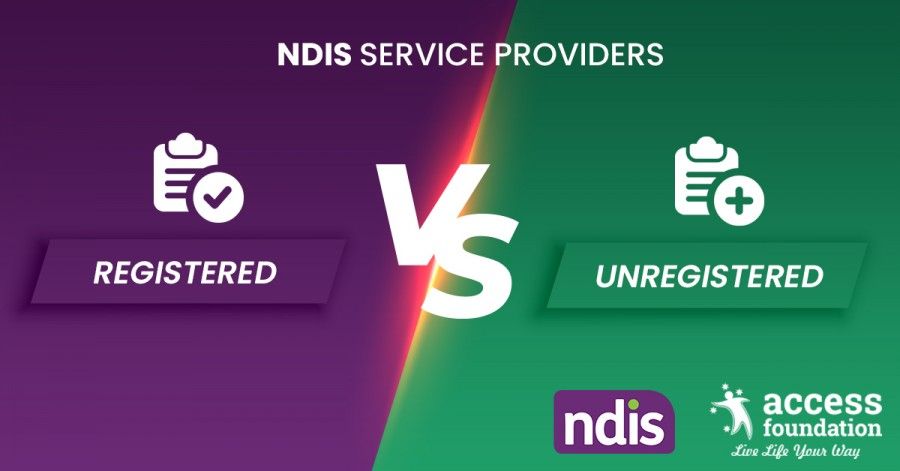AS we know, NDIS service providers help the NDIS participants get the required funding from NDIS. They help people with disabilities in achieving their goals and help them with the funding provided by NDIS. NDIS support Service providers have different areas of experience and expertise.
AS we know, NDIS service providers help the NDIS participants get the required funding from NDIS. They help people with disabilities in achieving their goals and help them with the funding provided by NDIS. NDIS support Service providers have different areas of experience and expertise. People with disabilities need to understand what they want and choose the right providers to meet their needs.
Now, there are two kinds of service providers who can deliver funded services to NDIS participants. Providers registered with NDIS are called registered NDIS service providers, and those who are not registered with the NDIS are unregistered NDIS service providers.
In this blog, we will talk about NDIS registered VS unregistered providers and how they work. We will discuss the differences between the two and which service provider you should choose to manage your NDIS plan and achieve goals.
The word ‘unregistered’ makes the participants feel uneasy and is often misunderstood. But it’s not what you think it is. In this blog, we will explore the world of registered and unregistered service providers so that the NDIS participants can make the right decision while choosing the NDIS service providers to help them with NDIS support services.
What’s the difference between NDIS registered vs. unregistered providers?
To put it simply, a registered NDIS service provider is the one who has registered their services with the NDIS and has been approved by NDIS. If your plan is NDIA managed, your options get restricted because you must choose registered NDIS service providers.
An unregistered service provider doesn’t have the complete approval of NDIS, but they can still provide valid service to the participants. If you are self-managing your NDIS plan, unregistered providers will send their invoices to you to pay, and you will have to claim the funds back from the NDIS using the NDIS portal, but if you are plan managed, your plan manager will do this for you. If you choose plan management or self-management over agency management, you will access registered and unregistered service providers.
Why do some service providers don’t register?
Some NDIS service providers don’t register because the registration process takes time, money, and effort. These are the three things that many small providers don’t have enough of. Many small providers, as well as big ones, don’t register themselves.
It’s essential to note that just because a service provider isn’t registered with NDIS services doesn’t mean they are not authentic enough. You can still engage with their services and hire them for NDIS plan management and NDIS support coordination. Many unregistered Service providers are highly skilled and provide high-quality NDIS support services. Unregistered service providers assist the NDIS participants in achieving the goals, just like registered NDIS providers. The NDIS also covers Their services, although the funding for these services must fit within the price guide.
NDIS Registered vs. Unregistered service providers- pros and cons.
Here are some of the pros and cons of both registered and unregistered NDIS service providers-
Pros of registered NDIS providers-
- Access to NDIA-managed participants
- The quality of service improves to a high standard
- In-depth documentation is involved in receiving the funding
- Reduces the risks because policies are implemented properly
Cons of registered providers-
- It requires so much paperwork and documentation
- Less pricing flexibility
- Maintaining operations becomes much more challenging.
Pros of unregistered NDIS service providers-
- Hiring unregistered Service providers don’t require a lot of paperwork.
- Getting started with unregistered service providers is quick as it requires minimal setup
- There are no licensing or audit fees
- Unregistered service providers offer services at lower prices
- The providers have a direct relationship with the NDIS participants
Cons of unregistered service providers-
- Unregistered providers take more time to build trust among the participants
- With unregistered participants, the participants don’t get the benefit of NDIA provided supports
- Participants still have to apply to NDIS support services to get the funding
These were some of the pros and cons of NDIS registered vs. unregistered service providers. You can either choose one of the two providers for NDIS plan management and NDIS support coordination services. The final choice is in your hands. You have to smartly decide what you want and choose the one among registered and unregistered NDIS providers.








*********itsnews@gmail.com
Blog wonder what a wonderful article i became a fan, i want more texts like this one i like it here barista classes